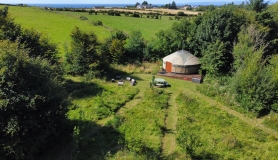HIGH UP ON A SHELF IN THE KITCHEN of my grandparents’ home there was a large white seashell. When I put my ear to its opening, I could hear a loud noise, as if the sea had come ashore and etched itself into the walls of the shell. Every time I visited them in southern Skåne, I would stand on tiptoe to reach the shell on the shelf. Ready to listen. It was always a surprising experience. The rushing sound inside created an image of a horizonless and stormy sea with waves so intense that the dynamics of them merged into a consistently full bodied roar. An almost deafening constancy of sound welled into my ear canals anwd made my hearing bones vibrate. Despite the fact that I eventually had the phenomenon explained to me – well, this is how it works – I was spellbound; I remained lost in wonder on many occasions at the experience of everything being still and silent. The silence was also to be found in the loudness, and for someone restless perhaps it was easier to hear it right there.
A child needs no next step; rather, everything happens when it happens and what is available comes to life and never requires meaning. But then play becomes a more serious game, and the child’s capacity to be here and now is quickly lost. In a time when we are constantly connected, we are instead tugged ever more intensely away from the now. It feels very much more like we’re actually on the way to being completely disconnected.
How Free are We?
This became clear to me a year or so ago, when I decided to make some minor changes that had a surprising and major impact. Just like everyone else, I’m often connected, which is both rewarding and entertaining in various ways. But increased knowledge of how digital operators exploit various triggers in the brain’s reward system in order to actively get us to act in a certain way means I have become more cautious. The digital world offers a chimera of free choice, but in fact our brains are being kidnapped and we don’t even know it is happening. The combination of an intelligent interface and smart behavioural scientists transforms our actions in some of the biggest digital arenas into something that is largely predetermined. The seemingly free choice becomes a limitation. But it’s not just that: We are not always satisfied with the choices that we make for ourselves.
According to American studies, we use our mobiles for 4.7 hours per day, of which several hours are spent on the major social media platforms. Another study conducted by the Centre for Humane Technology that looked at 200,000 participants identified that more than half stated they were dissatisfied with how they spent this freely chosen time on digital platforms. Your own choice has created a type of behaviour that is hard to break and, what is even worse, leads to selfreproach. We continue to consume even though we are no longer hungry. Doped by smart design. Increasingly disconnected. Increasingly absent.
A Media Fast
I decided to create interfaces and time zones in my home. A media fast in order to rest my brain muscles. The first thing that happened was that I became more attentive to the transition between doing and being. The transition between the outer environment and the inner. When I came home, I wanted to create a clear boundary and stop for a while, to enable me to put things that might distract me to one side. I began to engage in a do-nothing-activity, like sitting down for a bit in a comfy armchair and just reflecting on things. Quite simply, a place to set down the day that had passed. Perhaps a final thought about something that was lingering on and needed to be brought to a conclusion. But also in order to be present with my family.
There is an incredible difference between this and coming home while leaving half of yourself in the outer world. Your kids will notice the difference in the way you listen.
Even more importantly, I began to switch off my phone and computer earlier in the evenings, turn them on later in the mornings, and I never took any form of electronics into the bedroom. In order to enable the last of these initiatives, I bought an analogue alarm clock. Yes – they still exist, and they work perfectly.
Mental Wellness
The impact was immediate and verging on amazing. When I left my digital devices, vast swathes of time were freed up – more than it was possible to efficiently measure. I didn’t realise how much free time screen time had robbed me of, but also how much mental time it had taken up afterwards that was focused on what I had experienced during the time at my screen.
When someone called after me, I no longer had to ask them to wait or even feel a degree of irritation. In the early days, those impulses were still noticeably there. A hand reaching for a phone without any idea at all what I was going to do with it.
When I went to bed in the evening, the desire to read books returned to me. Reading a book can be an occupation, but it is completely different from endlessly scrolling through the Internet. A book has a final chapter; a book only has a finite number of pages. The Internet never ends. The wonderful feeling of finishing something now gave me a blessed, stressfree end to the day. Screen time was replaced with intervals in which creativity once again had room to blossom. When I no longer had anything to do during longer, continuous periods of time, more and more ideas began to come to me. Like on all those days when I was little and there was nothing to do. Just like many mothers of that era, my mum had an unassailable confidence in the benefits of being outside as soon as the clouds dispersed. I remember many occasions where I wandered up and down the street we lived on, sat down or hung around on the pavement and hoped a friend would turn up. Being bored was one of the best things I could experience. Being bored is a springboard to creativity.
But it’s not only that. How can we ever know who we are if we never completely stop and fall silent? How are we even supposed to be able to hear our own thoughts?
Magnus Fridh grew up in southern Sweden. He discovered meditation in his teenage years, and now teaches Ashtanga yoga, mindfulness and meditation classes.
MORE INSPIRATION
READ The Art of Stillness in a Noisy World by Magnus Fridh, translated by Ian Giles (Hardie Grant)
FIND Magnus online at magnusfridh.com







